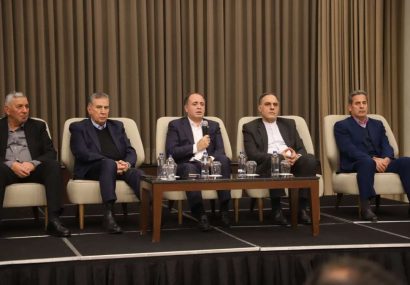Efforts to Resolve Turkey’s Customs Issues
TEHRAN (Iran News) Gholamreza Nouri Ghezeljeh, who was leading an economic delegation to Turkey, highlighted in a meeting with Iranian agricultural and food industry entrepreneurs that the government, Ministry of Agriculture Jihad, and diplomatic channels are focused on strengthening relations with neighboring countries, especially Turkey. The participation of over 180 economic stakeholders in this visit demonstrates the Iranian private sector’s readiness to engage more robustly in this endeavor.
Nouri Ghezeljeh reaffirmed the ministry’s support for agricultural product exports, noting that Iran’s nomadic products are a significant export potential. However, advancing this sector requires transformative changes in food and agricultural product packaging industries and streamlined licensing for export terminals. He also welcomed and supported the private sector’s participation in international agricultural and food exhibitions abroad.
Addressing efforts to resolve customs issues with Turkey for Iranian exporters, Nouri Ghezeljeh stressed that the 14th government’s guiding principle is adherence to legal frameworks. He emphasized the need to prevent arbitrary directives that could damage exporters’ credibility, promising that the government’s export policies would be announced transparently.
Nouri Ghezeljeh stated that private and cooperative sector activities are key to revitalizing Iran’s economy, adding that the government and the president firmly believe in supporting private sector initiatives.
He remarked that traditional governmental approaches lack efficiency awareness, whereas the private sector values capital efficiency and actively implements it. He pointed out that the 32% growth in agricultural exports over the past nine months reflects the private sector’s hard work and reaffirmed the need to eliminate barriers impeding private sector activities, production growth, and exports. The government remains steadfast in supporting the private sector.
Highlighting the determination of Iranian and Turkish officials for effective bilateral cooperation, Nouri Ghezeljeh noted the numerous agricultural commonalities between the two countries. He mentioned coordination with the Ministry of Foreign Affairs to involve experts from the Ministry of Agriculture Jihad in economic consultations with countries with significant agricultural exchanges.
Mohammad Hassan Habibollahzadeh, Iran’s ambassador to Ankara, praised the presence of economic stakeholders in Turkey, calling it one of the largest economic gatherings between the two nations. He noted that over 20% of Iran-Turkey trade volume is dedicated to agriculture, with bilateral trade exceeding $14 billion in the first nine months of 1403 (March to December 2024).
During the meeting, several agricultural and food industry entrepreneurs discussed challenges and barriers to agricultural production and export.
According to IRNA, on Thursday, Nouri Ghezeljeh led a commercial delegation of 180 Iranian economic stakeholders, traders, producers, and exporters from the agricultural sector to Turkey.
During the visit, Nouri Ghezeljeh toured Turkey’s largest gene seed bank and Ankara’s food control laboratory, engaging with officials to discuss the latest genetic technologies and initiatives related to food security.
Additionally, during this two-day visit, Nouri Ghezeljeh was scheduled to meet with Turkey’s Minister of Agriculture and Forestry, Ibrahim Yumakli. He will also deliver a speech at the Iran-Turkey Agricultural Development Conference, attended by traders and private sector stakeholders from both countries’ agricultural industries, focusing on expanding international cooperation through agricultural diplomacy and regional food security.
- source : IRAN NEWS ECONOMIC DESK






























